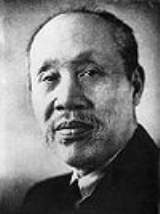
Dong Biwu
Encyclopedia
Dong Biwu was a Chinese
communist
political leader during the regime of Mao Zedong
.
, Hubei
. He was the President (Chairman of the Executive Committee) of China from 1948 to 1949 and Acting President from 1968 until 17 January 1975 when Zhu De
became the succeeding Chairman of the Standing Committee of the People's National Congress (formal Head of State). He was also Vice-President of the People's Republic of China from 1959 until 1975, jointly with Soong Ching-ling
. In 1975 he was elected Deputy Chairman of the Standing Committee of People's National Congress (Parliament).
Dong was a member of Politburo of the Communist Party of China
from 1945 to 1975. He was elected one of nine members of the Standing Committee of the Politburo at 10th Congress of the Communist Party in 1973.
He died just a year before Mao and several other important politicians like Zhou Enlai and Zhu De.
In 1991, a statue of Dong Biwu was erected in one of Wuhan
's central squares, Hongshan Guangchang. Hubei Provincial museum houses a collection of Dong's personal items.
|-
|-
|-
|-
China
Chinese civilization may refer to:* China for more general discussion of the country.* Chinese culture* Greater China, the transnational community of ethnic Chinese.* History of China* Sinosphere, the area historically affected by Chinese culture...
communist
Communism
Communism is a social, political and economic ideology that aims at the establishment of a classless, moneyless, revolutionary and stateless socialist society structured upon common ownership of the means of production...
political leader during the regime of Mao Zedong
Mao Zedong
Mao Zedong, also transliterated as Mao Tse-tung , and commonly referred to as Chairman Mao , was a Chinese Communist revolutionary, guerrilla warfare strategist, Marxist political philosopher, and leader of the Chinese Revolution...
.
Biography
Dong Biwu was born in HuanggangHuanggang, Hubei
Huanggang City is a major municipality in eastern Hubei Province, China. It is situated to the north of the middle reaches of the Yangtze River and is bounded in the north by the Dabie Shan mountain range....
, Hubei
Hubei
' Hupeh) is a province in Central China. The name of the province means "north of the lake", referring to its position north of Lake Dongting...
. He was the President (Chairman of the Executive Committee) of China from 1948 to 1949 and Acting President from 1968 until 17 January 1975 when Zhu De
Zhu De
Zhu De was a Chinese militarist, politician, revolutionary, and one of the pioneers of the Chinese Communist Party. After the founding of the People's Republic of China, in 1955 Zhu became one of the Ten Marshals of the People's Liberation Army, of which he is regarded as the founder.-Early...
became the succeeding Chairman of the Standing Committee of the People's National Congress (formal Head of State). He was also Vice-President of the People's Republic of China from 1959 until 1975, jointly with Soong Ching-ling
Soong Ching-ling
Soong Ching-ling , also known as Madame Sun Yat-sen, was one of the three Soong sisters—who, along with their husbands, were amongst China's most significant political figures of the early 20th century. She was the Vice Chairman of the People's Republic of China...
. In 1975 he was elected Deputy Chairman of the Standing Committee of People's National Congress (Parliament).
Dong was a member of Politburo of the Communist Party of China
Politburo of the Communist Party of China
The Central Politburo of the Communist Party of China or Political bureau of the CPC Central Committee , formerly as Central Bureau before 1927, is a group of 24 people who oversee the Communist Party of China...
from 1945 to 1975. He was elected one of nine members of the Standing Committee of the Politburo at 10th Congress of the Communist Party in 1973.
He died just a year before Mao and several other important politicians like Zhou Enlai and Zhu De.
In 1991, a statue of Dong Biwu was erected in one of Wuhan
Wuhan
Wuhan is the capital of Hubei province, People's Republic of China, and is the most populous city in Central China. It lies at the east of the Jianghan Plain, and the intersection of the middle reaches of the Yangtze and Han rivers...
's central squares, Hongshan Guangchang. Hubei Provincial museum houses a collection of Dong's personal items.
External links
Biography of Dong Biwu|-
|-
|-
|-

